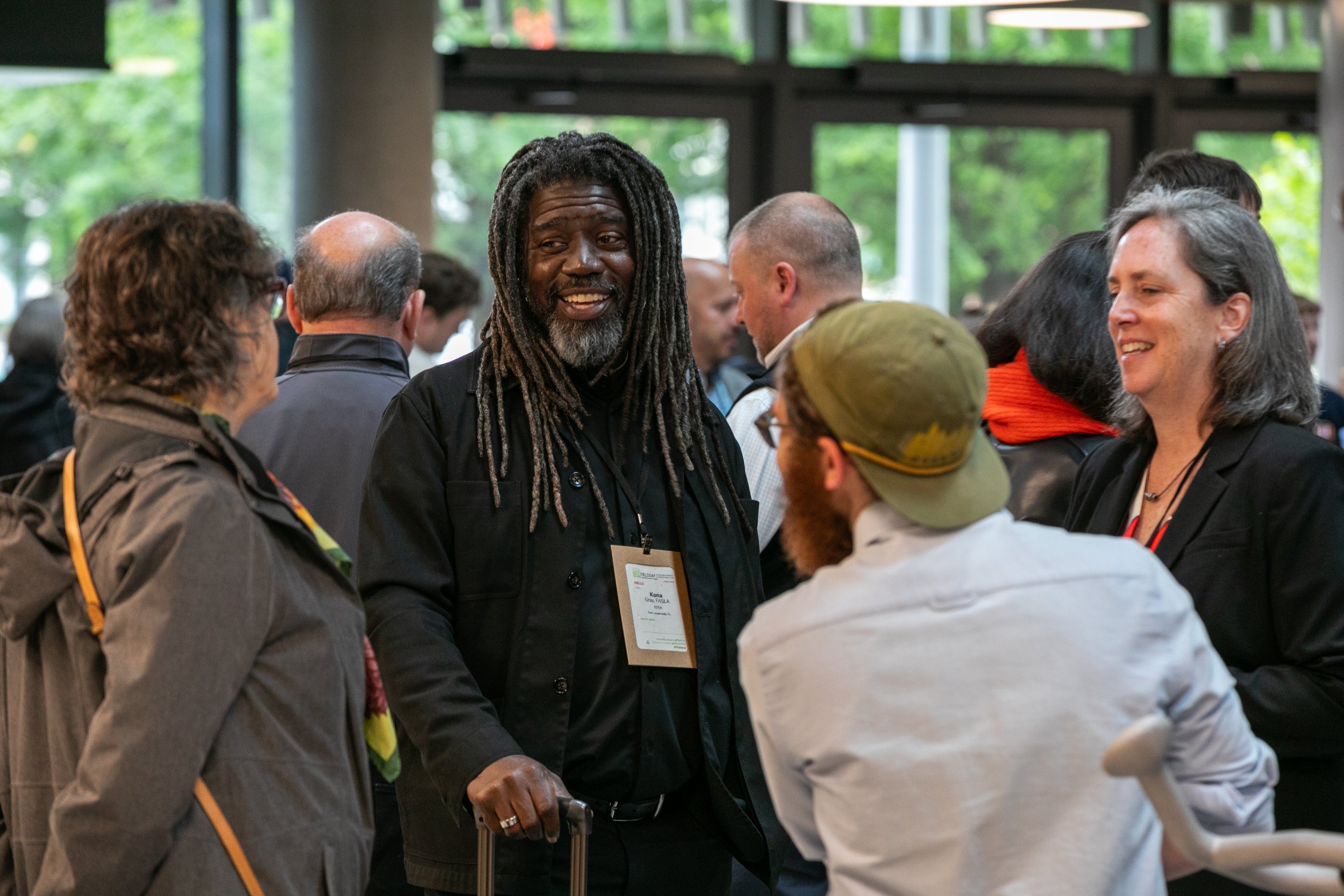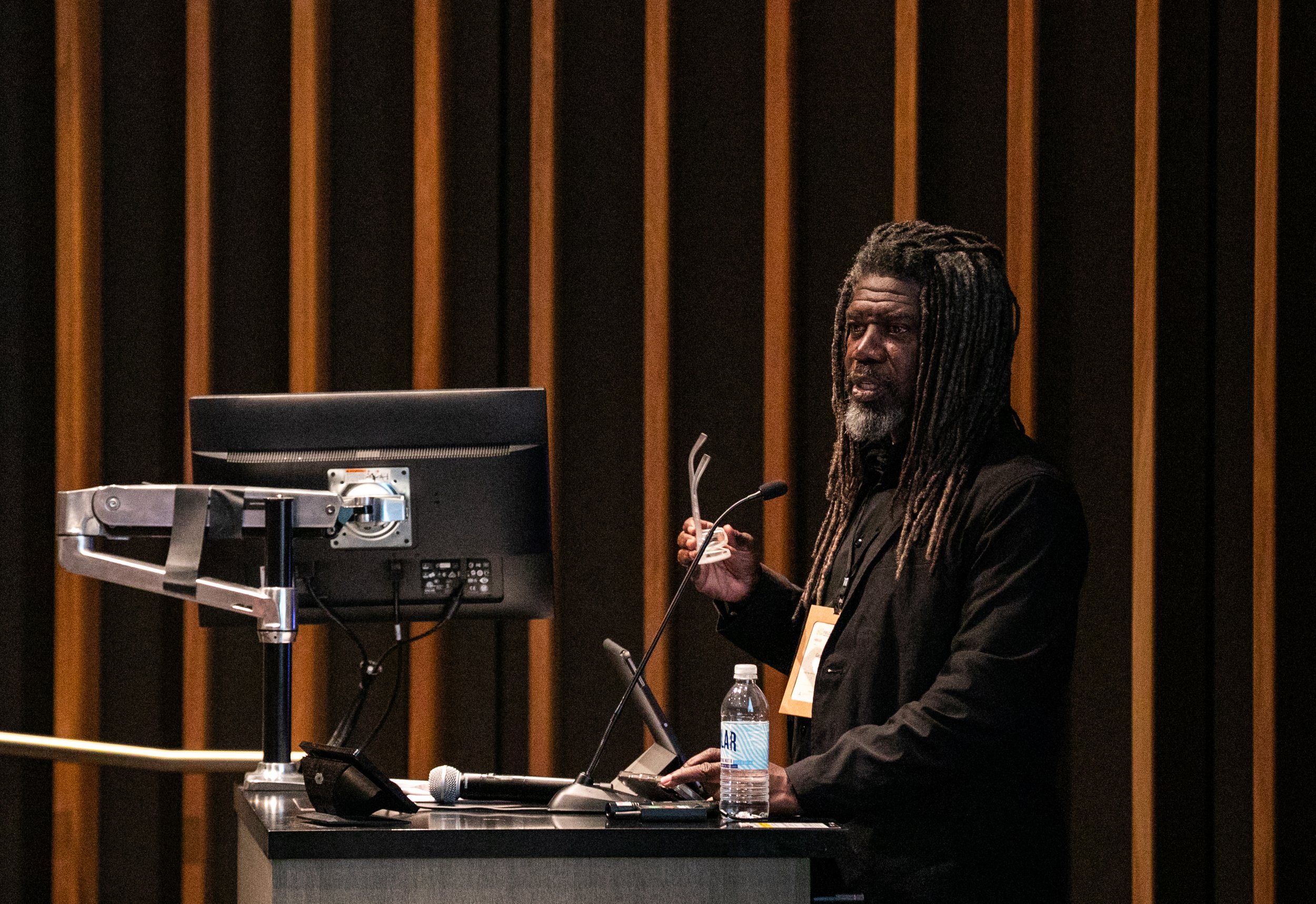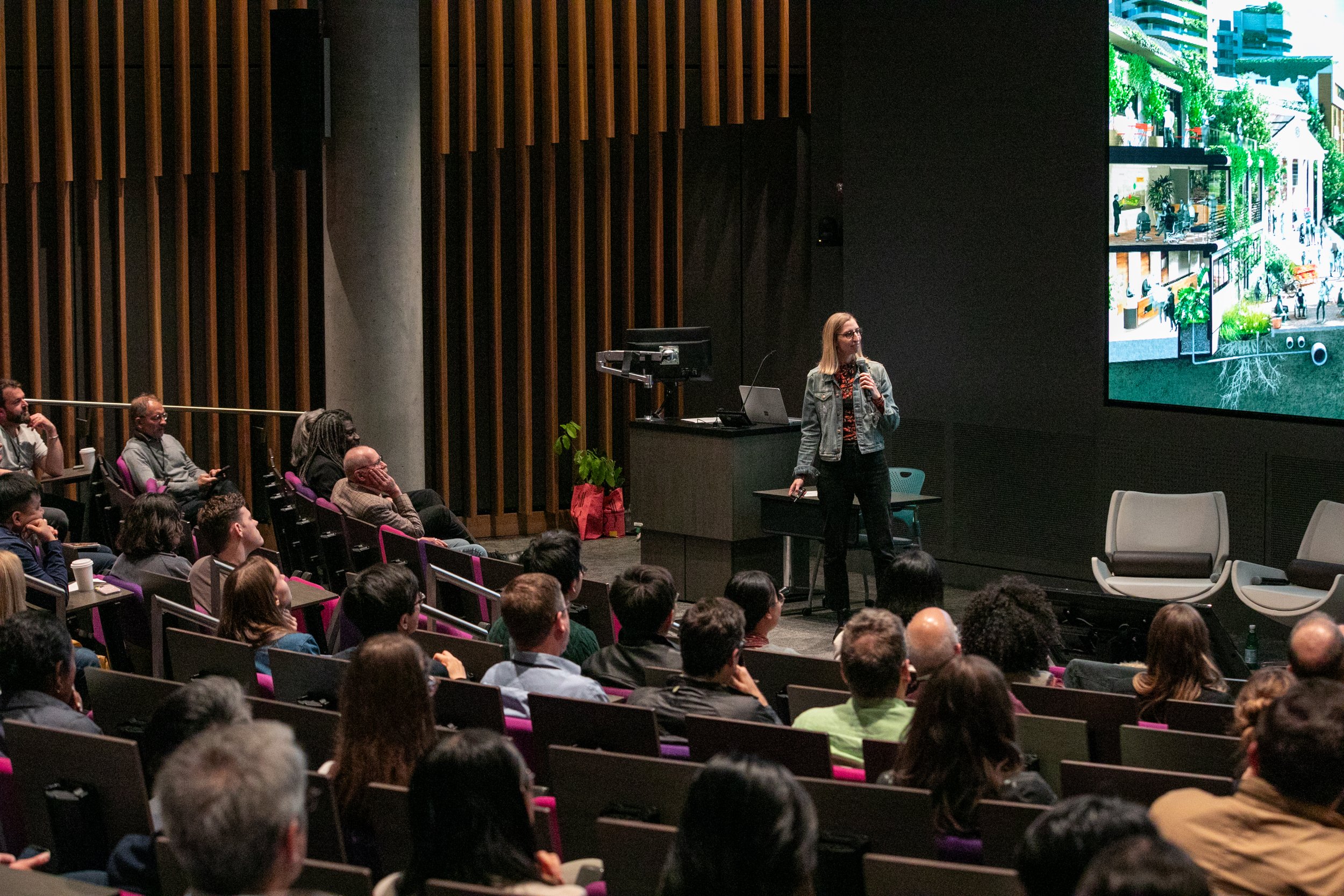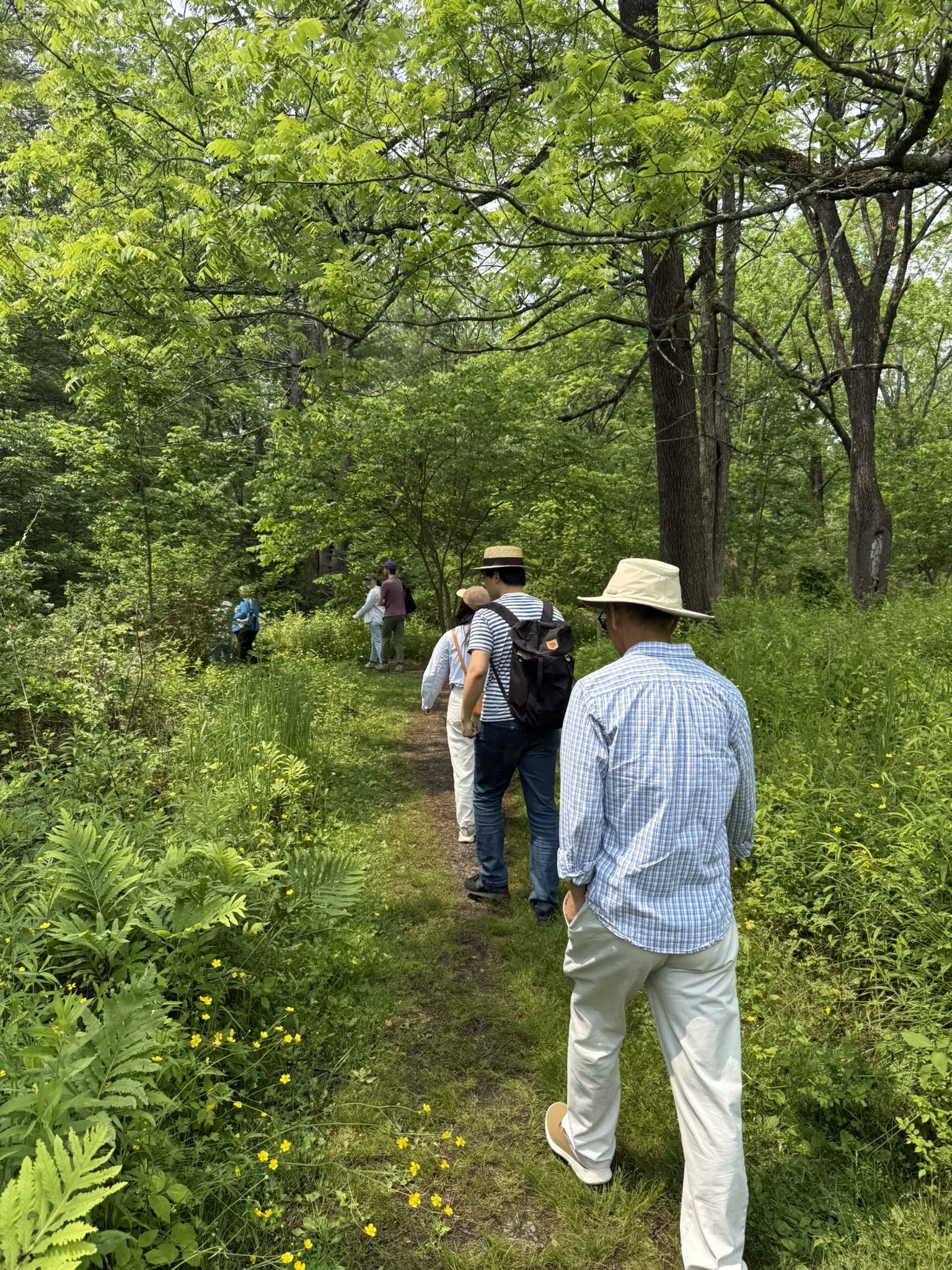
SAVE THE DATE
Fieldday 2026 will take place on Friday, May 1 at the David Rubenstein Treehouse at Harvard University.
Call for proposals, tickets + more coming soon!
For information, including sponsorship opportunities, contact Billy Craig at conference@bslanow.org.
Fieldday is the annual conference for landscape architects and design and construction professionals across our region. Horticulturalists, arborists, architects, engineers, planners, developers, policy makers, academics, green industry leaders; practitioners who create residential gardens to regional parks, outdoor spaces large to small; urban to rural, forest to meadow, river to coast… All who design, make, and care for landscape architecture in New England: this is for you.
Fieldday is created collaboratively by the ASLA Chapters of New England.
























Fieldday is a day of education, connection, and celebration….
On this page — scenes from Fieldday 2025. Thank you Anthony Crisafulli Photography for capturing the spirit of the day!
Program, speakers, presentations + related resources from Fieldday 2025
Find PDFs of slide presentations linked with each session
Morning Kickoff Keynote
Opening Keynote with Samantha Horn, Maine Office of Community Affairs
Click here to view the Keynote slideshow
Click here for the VIDEO recording of the Keynote + Lightning Talks
Climate Action Lightning Talks
The morning Keynote and Lightning talks offered 2.0 LA CES HSW and 2.0 AIA LU HSW
Blueprints for Biodiversity, Miles Connors, Parterre Ecological
Companion Planting 101, Ashley Robinson, Landscape Designer
Decarbonizing the Value Chain, Dan Delongchamp, Vestre
Decarbonizing Your Specifications: Building Landscapes with Salvaged Wood, Zac Tolbert, PLA, LEED AP, Cambium
DEI Ally, Luisa Oliveira and Estello Raganit, RLA, ASLA, BSLA DEI Co-chairs
Educating and Empowering the Future Design Workforce: Meaningful Internships and Apprenticeships, Jen Lawrence, Hideo Sasaki Foundation
Empowering communities to build resilient, biodiverse landscapes, Tyler Refsland, Wild Seed Project
Engaging Community Through Sustainable Urban Rooftop Design, Mark Winterer, Recover Green Roofs
Ethical Decarbonization: Design For Freedom as a Tool for Climate Action, Louis Fusco, PLA, Louis Fusco Landscape Architects
Maine On The Edge: Rethinking Homes on Maine's Changing Coast, Jamie Hark, VIEWSHED
Plant Survey: Data reciprocity for plant growers and specifiers, April Maly and Anna Curtis-Heald, BSLA Plant Sourcing Task Force
Synthetic Turf: Case for Equity and Inclusion, David Warner, PLA, Warner Larson now IMEG
Waterfront Edge Design Guidelines, Tom Klein, Waterfront Alliance
Workshops and Panels
Listed by session name, in alphabetical order
Click on the + sign to see speakers, descriptions, and presentation PDFs
Each session was approved for 1.0 LA CES and 1.0 AIA LU; most are HSW
-
Caseylee Bastien, RLA, CPSI, BSC Group
Aqsa Butt, SITES AP, BSC Group
Chelsea Kilburn, Stoss
Albert Chen, Stoss
Todd Mistor, Boston Parks and Recreation Department
Access to the urban forest is essential for community health and well-being amid climate change and urban heat, yet cities face significant challenges, including canopy loss, biodiversity decline, uneven coverage, maintenance burdens, and interagency coordination. The session will start with Boston’s Urban Forest Plan, a research-driven planning effort informed by data, mapping, and diverse stakeholder engagement to promote environmental justice and tree equity. The plan informs both current maintenance as well as future planning efforts. Cambridge’s Triangle Park Urban Forest demonstration project will illustrate how ecological applications transform an underutilized traffic island into a robust and occupiable forest that supports biodiversity, stormwater management, and reduced maintenance with multi-structure successive woodlands. Finally, we will discuss two of Worcester’s innovative Miyawaki Forest installations, where dense, biodiverse, fast-growing pocket forests provide ecological and community benefits, demonstrating transformative urban greening strategies.
-
Phil Barlow PLA, AICP
Jessalyn L. Jarest, PLA, ASLA, Jessalyn Jarest Landscape Architecture, COLLAB Landscape Collective
Emma Schiffman Kelly, ASLA, Emma Kelly Landscape, COLLAB Landscape Collective
Have you ever wondered what it takes to start your own small business? This session will explore the structures and workings of three very different small landscape architecture offices, ranging in size from 1 to 13 people; and both residential to public sector projects. The panelists will share their stories about firm structure, the evolution of their practice, and try to answer all of your questions about small firm life.
-
Nette Compton, PLA, Mill River Park Collaborative
Robert Stigberg, PLA, Director of Maintenance and Capital, Rose Kennedy Greenway
Robert Adams, PLA, Halvorson | Tighe & Bond Studio
Sean Ragan, PLA, Halvorson | Tighe & Bond Studio
How do we create and sustain public open space in our cities and towns in the face of increasing competition with real estate development, limited municipal and grant funding, and high operating costs? Beyond the traditional model of a municipally created and sustained public open space lies a range of creative pathways for cities and municipalities. Based on case study examples of the Mill River Park Collaborative in Stamford, CT and The Rose Kennedy Greenway in Boston, MA, we will explore creative models to structure and financially sustain public open space through public-private partnerships, tax increment financing (TIF) revenue, and other sources of revenue. The panel of landscape architects will also discuss lessons learned over time about how those operating structures inform public open space design.
-
Matthew Cunningham, RLA, Matthew Cunningham Landscape Design LLC
Lauren Stimson, ASLA, FAAR, Stimson
This session conceptualizes the farm as a place of experimentation and study that extends beyond the traditional landscape architecture studio. Two practitioners will share why they turned to the rural landscape for inspiration and how their farms have evolved into laboratories for horticulture, ecology and fieldwork, and how their research and design initiatives have informed the identity and culture of their firms.
-
Sebastian Gutwein, Regenerative Design Group Cooperative
Caseylee Bastien, RLA, CPSI, BSC Group
This presentation will explore how implementing the 2023 Healthy Soils Action Plan (HSAP) can transform our approach to landscape design across urban, suburban, and rural settings. We’ll discuss the profound impacts of current development practices on soil health and present practical, evidence-based recommendations for improving soil functions like stormwater management, nutrient retention, and carbon sequestration before, during, and after construction. Case studies will highlight successful applications of these practices, demonstrating how they can enhance habitats for plants, animals, and insects in diverse environments.
In addition, the session will facilitate an engaging discussion on overcoming the challenges of integrating soil health practices into landscape projects. Participants will have the chance to contribute feedback and wisdom that will shape further recommendations and best practices to be included in a “Guide for Implementing the Healthy Soils Action Plan in Design and Construction”, authored by Regenerative Design Group and other partners. The outcome of this session will be a new appreciation of the role of soil and important attendee input into the “Guide” - with the effect of having potentially large impacts on carbon sequestration, habitat regeneration, and ecosystem health across Massachusetts and New England.
-
Mary Lydecker, RLA, ASLA, LEED AP, Hargreaves Jones
Brian Gibbons, Rose Kennedy Greenway
Sharon Komarow, RLA, ASLA, KMDG
Landscape architects are increasingly at the foreground of projects that integrate significant public open space, multi-modal pedestrian and bicycle connectivity, and community programming with existing or reconstructed transportation facilities. This includes parks capping over or weaving below highways; the insertion of shared-use trails alongside active railways; and the re-envisioning of historic streets and open spaces to support the cultural, economic, and environmental resilience of cities. These projects deftly apply the unique creative and technical skills of landscape architects, while also emerging from inclusive and robust community engagement processes. Projects that will be profiled to explore these issues include:
North Meadow on the Greenway, The Rose Kennedy Greenway (Boston, MA)
Main Street & Central Park (Johnstown, PA)
Grand Junction Multi-Use Path (Cambridge, MA)
I-395 Underdeck & Heritage Trail (Miami, FL)
The Stitch (Atlanta, GA)
-
Nathanael Card, BSLA Plant Sourcing Task Force
Carl S. Hesselein, Pleasant Run Nursery
Donny Piccirillo, Pierson Nurseries
Jasmin Callahan, Dragonfly Natives
John Gedraitis, Van Berkum Nursery
The BSLA Plant Sourcing Task Force invites you to an open discussion with four leaders from nurseries across New England. The topic: How can landscape architects and nursery growers have a mutually beneficial relationship? We discuss current barriers to collaboration such as different “languages”, different expectations, and lack of communication. We’ll then discuss strategies to overcome them, starting with pulling back the curtain on the business pressures on the nursery industry. Our two skill sets as designers and growers must work in tandem to achieve true success for our planted projects.
-
Edward Kutchmanich, MCH, ISA & MCA certified arborist, AOLCP, Botanica Land Care
Madalyn Becker, MCH, AOLCP, Botanica Land Care
Bryan Obara, BOLD Meadows
Andrew Korzon, PLA, Larry Weaner Landscape Associates
As a team of designers and land care professionals, we are examining the complexity of meadow requests by clients and designers. In an effort to encourage designers to either begin or continue including meadow-type components, we will provide examples of common challenges and offer possible solutions. We will provide specific examples of different typologies including: site conditions, species selection, implementation and maintenance. We will offer insight for client education, managing expectations, and examine commonly asked questions.
-
Sohyun Park, PhD, ASLA, SITES AP, University of Connecticut
Zahra Ali, PhD Student, University of Connecticut
Anna Hilary, Undergraduate student, University of Connecticut
Taghreed Hussein, Undergraduate student,University of Connecticut
Biodiversity is a broad and increasingly important concept in landscape architecture and beyond. However, addressing biodiversity challenges and achieving meaningful outcomes requires collective efforts from individuals, organizations, agencies, and clients. While planting native species is valuable, true biodiversity-centered design goes beyond that. This presentation will explore the integration of diverse living organisms that form entire food webs and species interdependencies in every designed space—large and small, visible and invisible, widely recognized or overlooked. It will highlight the importance of a multispecies approach, showcasing biodiversity-positive projects and addressing implementation challenges. The discussion will cover pathways to biodiversity-centered design, including developing species-specific habitats, integrating monitoring mechanisms, collaborating with scientists before and after projects, and setting measurable biodiversity goals. Additionally, it will examine the role of system-level changes, such as zoning regulations and municipal design guidelines, in mainstreaming biodiversity-focused design. The talk will conclude with a call for stronger land stewardship and collective action to support thriving biodiversity systems through design and policy.
-
Luis Perez Demorizi, Parks, Rec & Culture Dept, City of Newton
Max Rome, PhD, Charles River Watershed Association
Indrani Ghosh, PhD, Weston & Sampson
Cassie Bethoney, RLA, Weston & Sampson
The Albemarle Field Project is a bold, collaborative effort to revitalize Cheesecake Brook, a key urban tributary of the Charles River. Led by the City of Newton, with the Charles River Watershed Association (CRWA) and Weston & Sampson Design Studio, this initiative addresses environmental challenges from urbanization—flooding, pollution, and habitat degradation. The project uses innovative solutions like subsurface infiltration systems, bioretention basins, native plantings, and creative design of recreational amenities to improve water quality, boost biodiversity, and strengthen climate resilience. Initial planning was supported by a $1.4 million Municipal Vulnerability Preparedness (MVP) grant, while detailed design was funded by a 2024 Coastal Zone Management (CZM) grant, highlighting the strength of municipal, state, and federal collaboration for sustainable development. Beyond environmental restoration, the project focuses on community enrichment through upgraded recreational facilities and improved accessibility in Albemarle Park, blending ecological health with public use. Set for phased completion by 2026, the Albemarle Field Project serves as a dynamic model for urban stream restoration and climate resilience.
-
Kelsey Kern, EIT, LEED AP, Nitsch Engineering
Hillary Waite, Town of Braintree, MA
Max Rome, Ph.D., Charles River Watershed Association
Newton Tedder, U.S. EPA New England
Stormwater quality and quantity have been large concerns for environmentalists and allied professionals for decades. Many regions have made great strides towards cleaner water with data to prove it, but have these efforts been enough to combat the effects of climate change? This session will demonstrate that water quality is an indicator of climate health and help to explain the complex relationship between water quality and climate change. Because stormwater has measurable parameters, this data is being used for regulatory purposes. This session will outline current and draft regulations compared to forecasts related to climate change. The speakers will present an overview of anticipated regulations in Massachusetts by MassDEP and the EPA – especially related to the Boston metro area. The speakers will then share thoughts on the role of landscape architects in accomplishing water quality goals along with necessary tools. The session will include a panel discussion of stakeholders advocating for and implementing stormwater regulations. The panel and audience will discuss opportunities and challenges related to stormwater management, how landscape architects can support or lead projects necessary to meet and exceed regulations, as well as educate site users and the public about the necessity of those regulations.
-
Emily Hunt, PLA, ASLA, CPSI, Copley Wolff
Brandon Kunkel, RLA, Weston & Sampson
This session will highlight two recently completed universal design playgrounds - the Louis A. DePasquale Universal Design Playground at Danehy Park in Cambridge by Weston & Sampson and the McGlynn School Universal Design Playground in Medford by Copley Wolff. Emily and Cheri will review key tenets of inclusive design, how they were applied to these projects, and key lessons learned.
Afternoon Closing Session
Presentations by Kona Gray, FASLA, PLA, and Pamela Conrad, ASLA, PLA, LEED AP, followed by a discussion with Samantha Horn
With a special introduction by Jim Donovan, FASLA
1.5 LA CES HSW and 1.5 AIA LU HSW.
Click here to view Jim Donovan’s presentation: Local to Global
Click here to view Pamela Conrad’s presentation: Climate + Biodiversity Positive Design
A big THANK YOU to our special guests…
Click the + to read their bios
-
As a firm leader with 30 years of experience in 30+ countries, his global design and management sense has positively shaped many environments. Kona envisions welcoming places that promote quality of life in diverse neighborhoods worldwide. His portfolio includes award-winning developments that solve meaningful global issues with emphasis on communities, parks, hospitality, museums, aquariums, healthcare, and campuses.
A Fellow of the American Society of Landscape Architects (ASLA), Kona currently serves as ASLA President Elect. He is a Past President of the Landscape Architecture Foundation and active member of the Urban Land Institute. Kona serves on the University of Miami Architecture School and Nova Southeastern University Business School Real Estate Advisory Boards as well as the University of Georgia School of Environment + Design Dean’s Council. He is a registered Landscape Architect holding a Bachelor of Landscape Architecture from the University of Georgia and Commercial Real Estate Certificate from Cornell University.
-
Governor Mills appointed Samantha Horn as Director of the Maine Office of Community Affairs in October 2024. Horn has three decades of experience in policy, planning and science, including consulting on public stakeholder engagement, policy work, and planning and siting for development projects. Prior to starting her consulting business, she was the director of science for The Nature Conservancy in Maine and worked in state natural resource agencies for nearly 20 years, including more than a decade in leadership roles at the Maine Land Use Planning Commission.
Horn has a Master’s Degree in the Human Dimensions of Fish and Wildlife Conservation from the University of Massachusetts, Amherst and a Bachelor’s degree in biology and English literature from Washington University in St. Louis. Her interests include rural community capacity, renewable energy siting practice, and integrated policy development. Horn was formerly on the boards of directors of the Maine Association of Planners, GrowSmart Maine, and the Maine Outdoor Heritage Fund.
-
Pamela Conrad, PLA, ASLA, LEED AP, is an internationally recognized landscape architect and the founder of Climate Positive Design. She teaches at the Harvard University Graduate School of Design, serves as a Salata Institute Faculty Associate, and passionately advocates for low-carbon, nature-based solutions that promote healthy communities and ecosystems.
As the inaugural American Society of Landscape Architects (ASLA) Biodiversity and Climate Fellow, lead author and chair of ASLA’s first Climate Action Plan, Architecture 2030 Senior Fellow, Landscape Architecture Foundation Fellow, and Harvard Loeb Fellow, Conrad has earned significant recognition in the field.
Her upbringing on a farm in Missouri has deeply influenced her 20-year career, which focuses on positive transformations of the exterior built and natural environment. Following nearly a decade of work in coastal adaptation, Conrad launched the Climate Positive Design Challenge and Pathfinder app in 2019, issuing a global call to improve climate and biodiversity impacts.
Her work has received widespread recognition, being featured in prominent platforms including United Nations climate conferences, The New York Times, Forbes, TIME for Kids, and the Metropolis Planet Positive Award
In person attendees received 6.5 LA CES HSW and/or up to 6.5 AIA LU HSW for the day. See below for the specific credits with each session.
Missing certificates from Fieldday?
Email admin@bslanow.org
Throughout the summer and fall, we turn things Inside/Out and go on site tours…
Join us outside! Site tours are FREE. Locations, dates, speakers, ticket links and all Inside/Out info is posted on the BSLA Calendar and on Instagram @BSLAoffice.
Inside/Out is a continually growing series… Is there a place you’d like to explore or share? Let us know.
Below: The 2025 series began with the China Trail Garden and the Acton Arboretum…














Fieldday ARCHIVE + other good stuff
-
Dear Landscape Architecture Community Leaders,
Are the Emerging Professionals in your life excelling at work? Are you looking for a way to reward them?
BSLA’s Fieldday is a great way to provide them with a break from the red lines and show them the fun side of landscape architecture. Read about the joy experienced by an EP at Fieldday 2024 below.
“BSLA Fieldday was by far the most fun I've ever had at a conference in my professional life. The event was exceptional in its organization. Each presentation I attended was relevant to my interests and covered a wide array of different topics. The event was the perfect balance between socializing, networking, and learning. I also very much enjoyed the in person tours on Saturday, I really hope that the tours this coming May are just as cool. The kayak tour on the Charles was such a treat.”
- Michael Amato, UMASS Amherst '24
Or maybe the Emerging Professionals in your life are suffering from burnout? Maybe their deadlines have been exceptionally hard and fast lately?
Burnout rehabilitation can be found through inspiration at BSLA’s Fieldday! See below about how an Emerging Professional was inspired last year.
“Last year’s BSLA Fieldday was not only extremely informative, but also immensely inspiring. It proved to provide me with great exposure to innovative projects and community directives within Maine and Massachusetts. As someone about to graduate and start my professional career, the BSLA Fieldday gave me a greater understanding of the diversity of firms and project types in the landscape architecture industry. I also got to form new relationships with leading practitioners, and reconnect with former classmates, faculty and colleagues. Overall, the BSLA Fieldday informed and excited me for my future in the field!”
-Izzy Dyer, UMASS Amherst ‘25
Regardless of where an emerging professional is at in their landscape architecture journey, they NEED to be at BSLA’s Fieldday.
Continue reading for more examples of emerging professionals loving last year’s events.
“Fieldday 2024 exceeded my expectations in many different ways. It was a great opportunity to see past colleagues, coworkers and professors and made it easy to make new connections within our industry. The sense of community and excitement that everyone carried made the day a blast. All of the speakers had an impressive wealth of knowledge to share and the variety of presentation topics kept the day interesting. As an emerging landscape architect this was easily the most impactful event I attended all year.”
-Marc Carlson, Northeastern University ‘23
“Last year's Fieldday was an incredible experience. The lightning talks were inspiring, and incredibly diverse. I learned so much from local firms, colleagues, and it was a fantastic opportunity to connect and grow professionally!”
-Lucia Peña-Banda, UMASS Amherst ‘23
"BSLA's Fieldday is an amazing opportunity for anyone in the industry to meet other students and professionals. It is a collection of those who love and care for how they make the world a better place. The lightning talks were one of my favorite events of the day, listening to a condensed presentation that could represent decades of work. I walked into the day not knowing anyone besides my classmate I attended with, but the hospitality I experienced made me feel as if the people I met that day, I had known for years. I would encourage anyone who is involved in landscape architecture or just wants to learn something new, to attend BSLA's Fieldday."
-Jack Malone, UMASS Amherst ‘25
FAQs
-
Walking or biking: 805 Columbus Ave, Boston, MA 02120
Public transportation: Both the Orange and Green Lines of the MBTA subway will get you close to the ISEC building at 805 Columbus Ave. For the Orange Line from downtown Boston, head outbound toward Forest Hills and get off at Ruggles Station. ISEC is a 5-minute walk from Ruggles Station. For the Green Line from downtown Boston, take an "E" train outbound to the Northeastern stop, the first stop above ground. ISEC is a 7-minute walk from the Northeastern stop.
Driving: The closest garage to the ISEC building is the Renaissance Park Garage, located at 835 Columbus Ave. It's a 1-minute walk, and rates can be found here. There are many other paid garages and lots within a 5-minute walk of ISEC, as well many metered spots around campus. Meters typically cost $2.50/hour, and most meters have a 2 hour time-limit, however.
-
Connect to NUWave-guest from your device's Wi-Fi options and you will be presented with a login page.
Select the 'Click here' link next to 'One Day Conference Login'.
Select Boston Society of Landscape Architects Fieldday (Annual Meeting) from the drop-down menu, and enter conf558782 for the Conference Code.
Check the box for 'I have read and accepted Northeastern's Appropriate Use Policy', and select 'Log In'.
You are now connected to NUwave-guest.
Having trouble connecting? See the full instructions here.
-
Really exciting! Fieldday is the annual conference for New England's professional landscape architecture community.
Fieldday 2024 was the inaugural edition.
AND
Fieldday will be followed by a series of site tours.
During COVID, when we couldn’t hold large, indoor in-person gatherings; we turned things “Inside/Out” and took the learning sessions outside. Now in its sixth year, this series continues! These landscape architecture site tours happen throughout the year, across New England. And, here, Inside/Out meets the conference, again!
-
We are! Fieldday is created collaboratively by the ASLA Chapters of New England.
Whether you’re a member of BSLA’s Maine and Massachusetts chapter, OR from another ASLA chapter OR not a member at all, we invite you to participate in this conference. All in our landscape architecture community are welcome.
-
We hope so! Especially if you and/or your company are passionate about the landscape architecture community. Sponsorship opportunities are limited so contact Billy Craig today at conference@bslanow.org with interest or questions.
-
All good things! The summit, now in it's fourth year, will be held on the main auditorium stage at Fieldday. As in the past, it will be anchored by the Climate Action Lighting Talks, which will now take place from the main stage AND will be broadcast (free, as always) via livestream to those online in New England and beyond.
-
Because of Fieldbook! Our annual ideas magazine. Fieldday and Fieldbook are both ways that we share knowledge, celebrate and catalyze our community, as we work together to advance the practice of landscape architecture in New England and beyond.
Fieldday also reminds us of that late spring day in the school year when we got to take a break from the normal routine and have fun together. This is that, too.
-
Yes! Fieldday will be followed by a series of site tours.
During COVID, when we couldn’t hold large, indoor in-person gatherings; we turned our conference “Inside/Out” and took the learning sessions outside. And — you guessed it — it’s pretty awesome to experience landscape architecture in the landscape.
Now in its sixth year, this series continues! These landscape architecture site tours happen throughout the year, across New England. And, here, Inside/Out meets the conference, again!
THANK YOU, 2025 Fieldday Sponsors!
Premium Sponsors
Sponsors
THANK YOU to Anthony Crisafulli for photography throughout the day.
THANK YOU to the Northeastern University College of Arts, Media, and Design, School of Architecture for hosting!






















